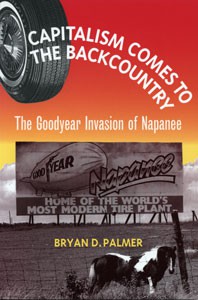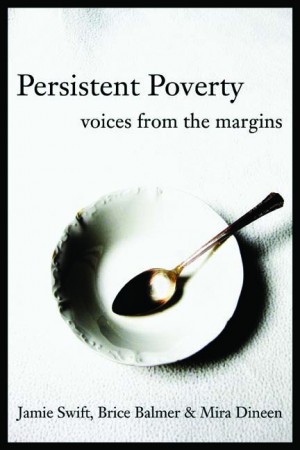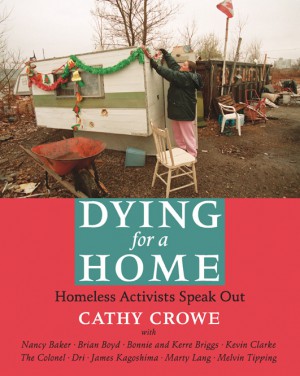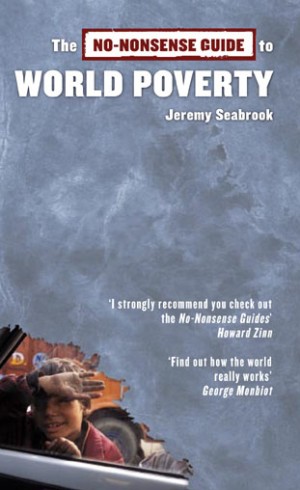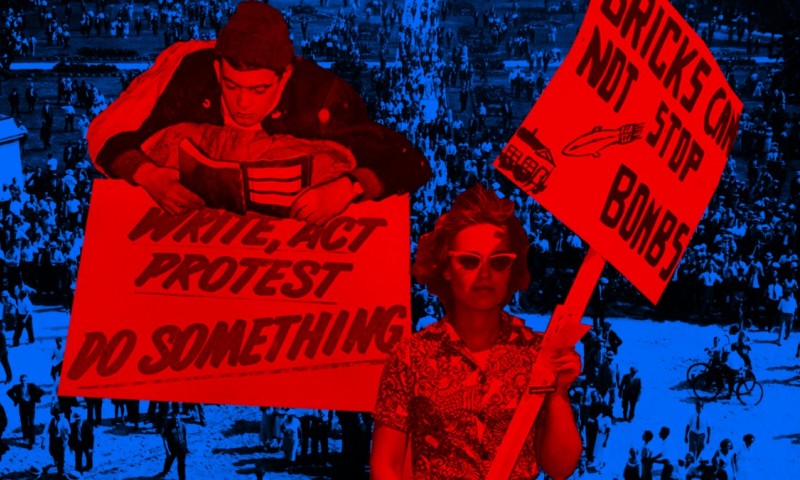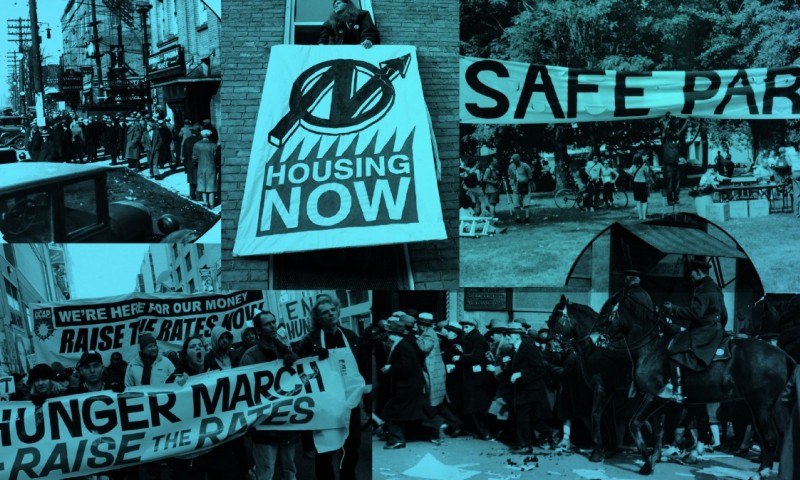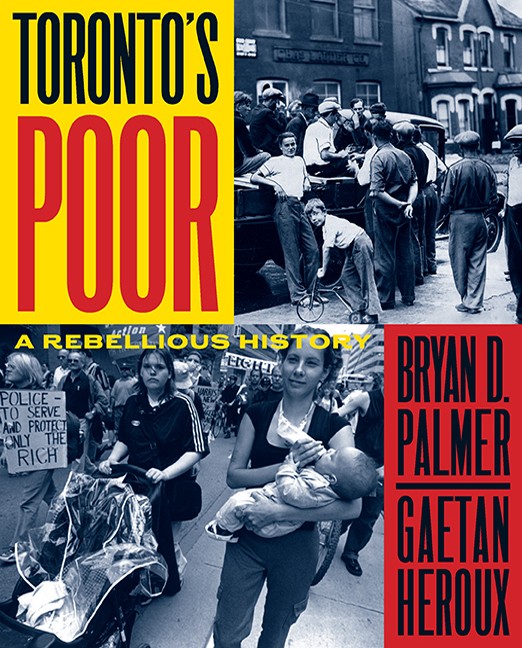
Toronto’s Poor
A Rebellious History
- CAWLS Book Prize for the Best Book in Work and Labour Studies, 2017 (Winner)
Toronto’s Poor reveals the long and too often forgotten history of poor people’s resistance. It details how people without housing, people living in poverty, and unemployed people have struggled to survive and secure food and shelter in the wake of the many panics, downturns, recessions, and depressions that punctuate the years from the 1830s to the present.
Written by a historian of the working class and a poor people’s activist, this is a rebellious book that links past and present in an almost two-hundred year story of struggle and resistance. It is about men, women, and children relegated to lives of desperation by an uncaring system, and how they have refused to be defeated. In that refusal, and in winning better conditions for themselves, Toronto’s poor create the possibility of a new kind of society, one ordered not by acquisition and individual advance, but by appreciations of collective rights and responsibilities.
Praise
Héroux and Palmer provide a powerful and instructive account of how generations of poor people in Toronto have resisted outright abandonment and challenged the inadequacies of reluctant provision. Sometimes their resistance has smouldered and at other times it has flared up, but it has been a constant and vital part of equation. In this age of austerity this book gives us reason to hope and expect that the rebellious history of Toronto’s poor is far from over.
– John Clarke, Ontario Coalition Against Poverty (OCAP)
Toronto’s history is always told as the history of its rulers. This remarkable, riveting book by Bryan Palmer and Gaétan Héroux turns these city-building mythologies inside-out. They retrieve the history of Toronto’s tramps, squeegee kids, unemployed, homeless, and wageless in one neighbourhood after another. The dispossessed here are not merely the victims of the boundless greed of capitalism. They are at the centre of class struggle, of communists and socialists, of poor peoples’ movements battling in the streets, of riots and cops, of housing squats and occupations. In the grit of the daily struggle of survival and resistance of the dispossessed, astonishing revelations about the real history of Toronto appear on virtually every page. A rebellious history, indeed—demanding an even more rebellious future.
– Greg Albo, Sam Gindin, and Leo Panitch, Socialist Project and Department of Political Science, York University
Palmer and Héroux show that Toronto has been an exemplary Canadian city: its poverty has been inclusive, although not perfectly equal-opportunity. It has embraced male and female, young and old, city and suburban, immigrant and native born, and not excluding First Nations. This is Toronto’s history from the bottom up, and with attitude. Long overdue.
– Richard Harris, School of Geography and Earth Sciences, McMaster University
This book not only fills important gaps in the literature, but also makes a valuable contribution to the history of the poor and disposed in one of the leading cities in North America. Furthermore, it may usefully serve as a basis upon which to construct more general comparative and transnational histories both of the poor themselves, their experiences, daily struggles, and movements, and of their relations with the rest of the working class and those in power. At once scholarly, lucid, well written, and reasonably priced (British publishers of very expensive hardback labour history books please take note!), this book will appeal to political activists and interested general readers as well as academics. It also offers an important rallying point for the future abolition of poverty and dispossession.
– Labour History Review
The book provides absorbing context in outlining how Torontonians situated on the poverty rung of the class structure have been treated—and how they’ve fought for survival.
– This Magazine
Toronto’s Poor tells an important and under-told side of this city’s history, where the civic narrative has often focused on waves of growth and prosperity, ignoring a continuum of dispossession and struggle here since before the city’s founding. In an era of precarious employment and when poverty is even more hidden than ever in the suburbs and apartment towers, Toronto’s Poor provides some context for current conditions.
– Shawn Micallef, editor at Spacing, Toronto Star columnist, author of Stroll: Psychogeographic Walking Tours of Toronto and Frontier City: Toronto on the Verge of Greatness
Toronto’s Poor shows us the importance of knowing and understanding our history because history can repeat itself. Whether it is in the nineteenth or twenty-first century, poor people’s experience of cold and hunger, crummy shelter conditions, inadequate housing, and vulnerability to die early are caused by bitter and punitive social policies. What is most exciting about this book is the mostly untold story of poor people’s resistance, activism and fight-back struggles that have and will continue to win huge victories alleviating poverty.
– Cathy Crowe, Street Nurse
This is a deeply engaging and exhaustively researched history of the resistance of the marginalized, the unemployed, the homeless, and the dispossessed of Toronto to the humiliation of relief and welfare policies directed against them over the past 185 years. There is no study like it in Canadian scholarship. Toronto’s Poor should become the starting point for teaching and writing about the history of anti-poverty mobilization in Canada for years to come.
– James Struthers, Department of History, Trent University
This book is important because the authors have a clear and illuminating understanding that the hardship and humiliations imposed on the poor meshes with the deteriorating life circumstances of the mass of working people.
– Frances Fox Piven, author of Challenging Authority: How Ordinary People Change America
An extremely well documented history of how Toronto’s destitute, homeless, and unemployed were scapegoated and typecast as undeserving of social support, and how they and others resisted and fought back against great odds. This is a history of capitalism, crisis, and class as played out in Canada’s largest city over two centuries. It brings into the picture the dispossessed and the struggle for progressive social change, which historical research too often ignores. An excellent account for all who care about the struggle for social justice.
– J. David Hulchanski, professor of housing and community development, University of Toronto
Contents
| Acknowledgements | |
| Part 1 | Introduction: The Long History of Toronto's Poor: Conceptualizing the Dispossessed |
| Capitalism, Crisis, and Class: Why Have the Poor Always Been With Us? | |
| Dispossession: The Nursery of Class Struggle | |
| Capitalist Crises: Class Conflict From Above and Below | |
| Toronto: A Locale Within the Global | |
| Class Struggle in Our Times: Bringing the Dispossessed into the Picture | |
| Class Politics and Dispossession: The Left and the Wageless | |
| Part 2 | “Cracking the Stone”: The Origins of Toronto’s Dispossessed, 1830–1928 |
| Land and Labour in Old Ontario | |
| Toronto's House of Industry | |
| In the Era of Confederation: Capitalist State Formation and the Poor | |
| The Underside of the Great Upheaval, 1873–1896 | |
| Protesting “Labour Tests” | |
| The Black Flag Remembered; The Tramp Reviled | |
| Capitalist Consolidation and the Left-Led Unemployed Movement in Pre-Second World War Toronto | |
| The Left and the Toronto Jobless Before the Great Depression, 1915–1925 | |
| Part 3 | “United We Eat; Divided We Starve”: The Toronto Unemployed Movement, 1929–1939 |
| Reds and the Unemployed in Canada’s Great Depression: From Third Period to Popular Front | |
| The Single Unemployed and Toronto’s Communist Battle for the Streets: Heroes 1914–Bums 1933 | |
| The Single Unemployed: Bound for Anything But Glory | |
| Laver vs. The Lodge: The Voucher War of 1932–1933 and the Consolidation of a Regulatory Order | |
| On the Trail of Harvey Jackson, William M. McKnight, Clifford Mashery, and George Haig: The Single Unemployed Present at Their Own Remaking | |
| Marginalizing the Marginal: Single Unemployed Women | |
| Toronto Trekkers | |
| Depression’s Denouement: The Winding Down of the Struggles of Single Unemployed Men, 1937–1939 | |
| Crisis of Unemployment = Housing Crisis | |
| Evictions: “They Shall Not Pass” | |
| The Jobless Take Job Action: Early Relief Strikes, 1932–1933 | |
| A “Red” Among Relief Recipients: Long Branch’s Ernest Lawrie | |
| Reds, Riots, and Raising the Relief Rates: March–May 1935 | |
| Upping the Ante: The Hepburn Offensive and the Militancy of the Unemployed, 1936 | |
| Lakeview Militancy and a Hepburn Ambush, 1938 | |
| Closing Out the Decade: Relief Strikes and the Call to Abolish Relief Work | |
| Part 4 | “A Hopeless Failure”: The Limitations and Erosion of the Modern Welfare State, 1940–2015 |
| The Uneven Origins of an Incomplete Welfare State | |
| In the Shadow of the Great Depression, War, and the Emerging Welfare State: Episodic Struggle in the 1940s, 1950s, and early 1960s | |
| A Sixties Turn: The Just Society, the New Left, and the “Discovery” of the Poor, 1965–1975 | |
| Hard Times: Capitalist Crises, Ideological Initiative, and the State Assault on the Dispossessed, 1973–2015 | |
| Part 5 | “Fight to Win!”: The Ontario Coalition Against Poverty and the Return/Revenge of the Dispossessed, 1985–2015 |
| Marauding Through the 1980s and into the 1990s: The Many-Sided Attack on the Poor | |
| Mobilizing Against the Marauders: The Revival of Poor People’s Agitations in the 1980s | |
| Marching to Mobilization: The Beginnings of OCAP | |
| Mulroneyville, NDP Welfare Cheats, and Operation Desert Gypsy | |
| Revolution from Above, Against Those Below: The Poor Fight Back | |
| Homelessness and the Freezing Deaths Inquest, 1995–1996 | |
| Squats and NIMBYs: OCAP Escalates the Struggle | |
| More Deaths, More Protests, More Complacency (And Worse) | |
| Squeegees, Soliciting, and the Safe Streets Act: OCAP Continues to Counter | |
| Ottawa Bound and Bringing the War Against Poverty Back Home to Queen’s Park | |
| “The Long Retreat is Over”: Common Fronts—Evicting Flaherty, Snake Walking Through Toronto’s Financial District, and Squatting for Affordable Housing | |
| Squatting With the Pope and the Tenants of Tent City | |
| Miller Time: Streets to Homes and the Death of Paul Croutch—Two Faces of Social Cleansing | |
| A Women’s Squat | |
| Raise the Rates! The Special Diet Supplement | |
| Turning on the TAP: Toronto Against Poverty | |
| Another Demolition Job: The Community Start Up and Maintenance Benefit | |
| Hostels Under Attack: OCAP Fights Back | |
| Part 6: Conclusion | “Bread I Want, And Bread I Will Have” |

